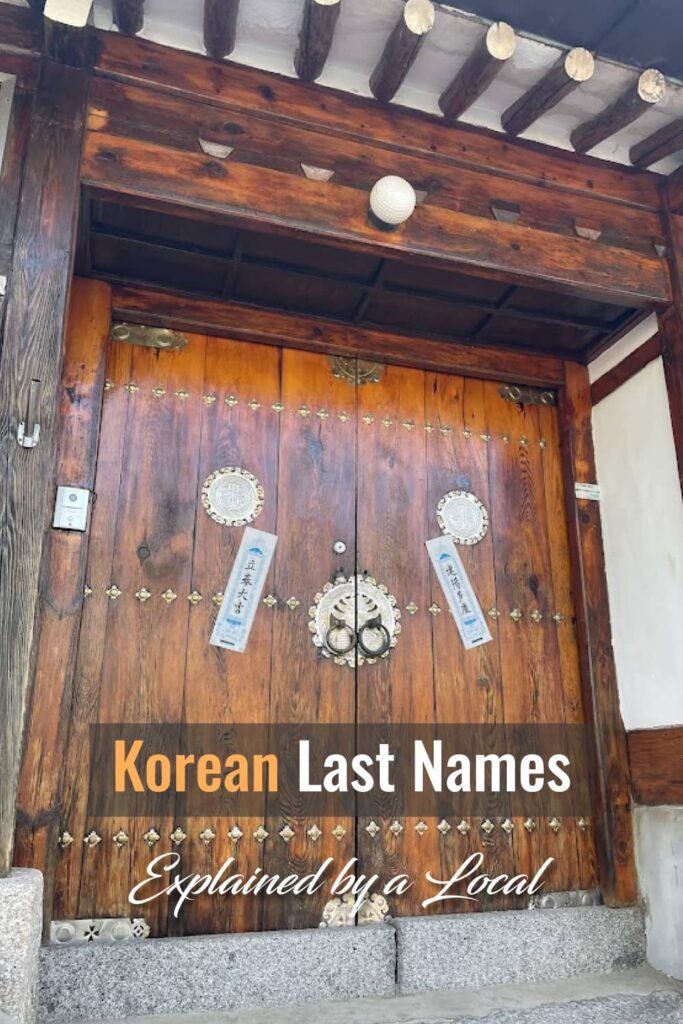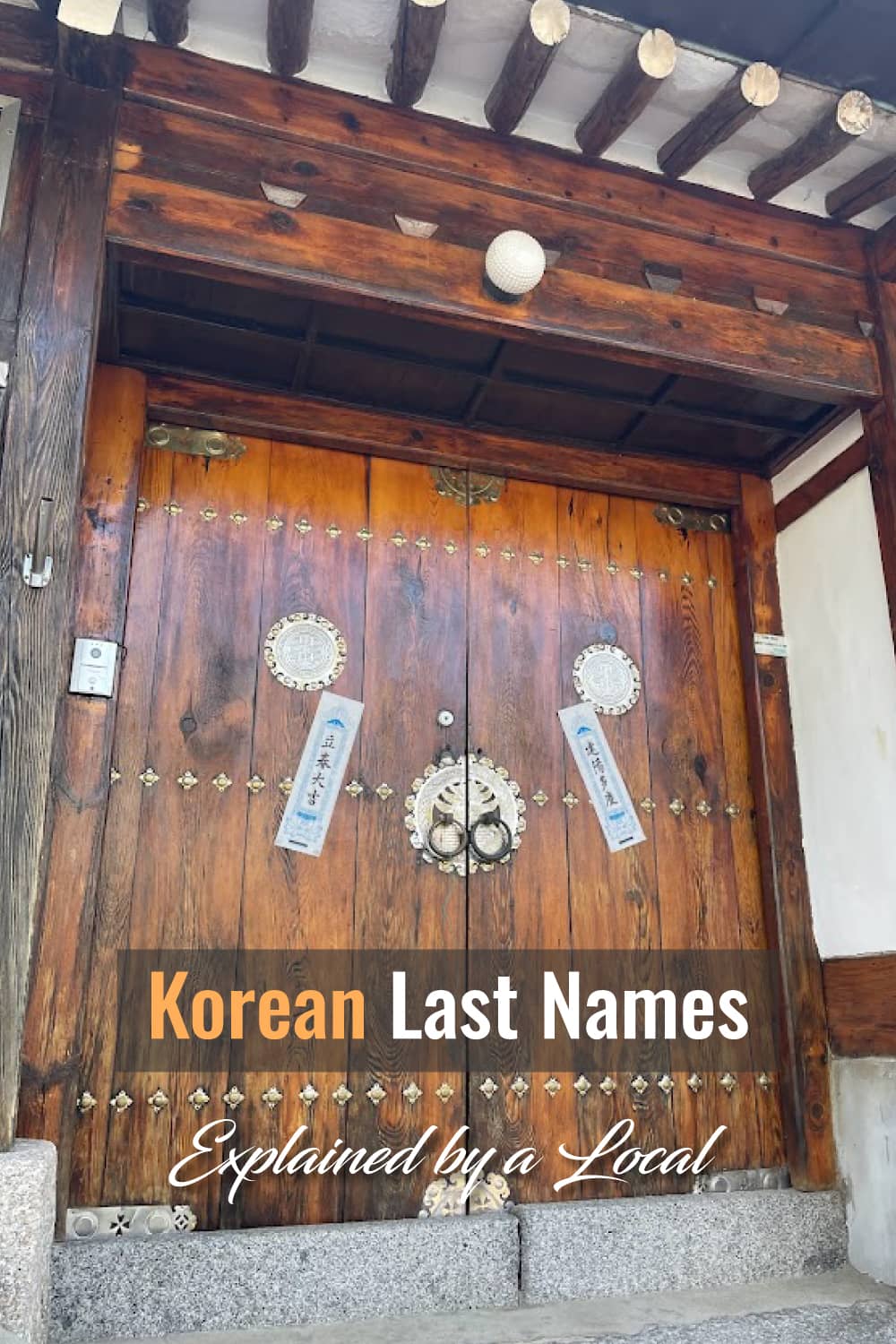Even though Korean last names don’t have special meanings, they say a lot about a person.
They include surname, family clan and faction.
This article covers:
- Korean word for last name
- Family clans
- Most common and rare surnames

Quick Summary
- Last name (family name or surname) is called Seong in Korean.
- Korean family names always come before the first name.
- Korean last names come with family clan (place of origin).
- Kim (22%), Lee (15%), and Park (8%) make up 45% of the Korean population.
What is the Korean word for last name?
Last name (family name or surname) is called “Seong (성)“, pronounced more like Song or Sung. It’s also known as “Seong-ssi (성씨)” to clarify that you’re referring to last names instead of gender, which is also seong.
Korean family names always come before the first name (ireum or 이름).
For example, V’s Korean name is Kim Taehyung, in which Kim is the surname while Taehyung is the given name.
A secret note about family clans (bongwan or 본관)
Every Korean knows their family clan (place of origin), which comes with their last name.
For example, my last name is Seo, but in detail, I’m the 3Xth descendant of Icheon (origin) Seo (surname), Wonsukgong-pa (faction).
When I meet someone with the same surname, we’ll ask each other which Seo we’re from. I’ll simply inform them I’m “Icheon Seo-ssi”.

What are the most common Korean last names?
Kim is the most common surname in Korea, accounting for 22% of the population.
There’s a proverb that goes, “searching for Mr. Kim in Seoul”, which is equivalent to “looking for a needle in a haystack.”
Three surnames, Kim (22%), Lee (15%), and Park (8%), make up 45% of the Korean population.
There’s even an old joke that goes, “If you throw a rock in Hanyang (old Seoul), you’ll hit either one Kim, Lee, or Park.”
Why are there so many people with Kim, Lee and Park as last names?
Some theories suggest that people bought genealogy (jokbo or 족보) or took on the surnames of their owners (slavery among Koreans was a thing for a while). And people preferred the royal surnames Kim, Lee and Park.
There were also cases where people received the surname of the region itself, such as Jeonju Lee for people in Jeonju and Gyeongju Lee in Gyeongju.
Another theory is that Korean surnames have always been biased from the beginning, and have nothing to do with genealogy falsification/purchases.
10 most common surnames by region (distribution of surnames in Korea)
| City/Province | 1st | 2nd | 3rd | 4th | 5th | 6th | 7th | 8th | 9th | 10th |
| Seoul | Kim (김) | Lee (이) | Park (박) | Choi (최) | Jeong (정) | Jo or Cho (조) | Kang (강) | Yoon (윤) | Jang (장) | Lim (임) |
| Incheon | Kim (김) | Lee (이) | Park (박) | Choi (최) | Jeong (정) | Jo or Cho (조) | Kang (강) | Yoon (윤) | Jang (장) | Han (한) |
| Gyeonggi-do | Kim (김) | Lee (이) | Park (박) | Choi (최) | Jeong (정) | Jo or Cho (조) | Kang (강) | Yoon (윤) | Jang (장) | Han (한) |
| Gangwon-do | Kim (김) | Lee (이) | Park (박) | Choi (최) | Jeong (정) | Jang (장) | Yoon (윤) | Jo or Cho (조) | Jeon (전) | Kwon (권) |
| Chungcheongbuk-do | Kim (김) | Lee (이) | Park (박) | Choi (최) | Jeong (정) | Jo or Cho (조) | Yoon (윤) | Jang (장) | Shin (신) | Kang (강) |
| Daejeon | Kim (김) | Lee (이) | Park (박) | Choi (최) | Jeong (정) | Kang (강) | Song (송) | Jo or Cho (조) | Yoon (윤) | Oh (오) |
| Sejong | Kim (김) | Lee (이) | Park (박) | Choi (최) | Jeong (정) | Lim (임) | Yoon (윤) | Kang (강) | Jo or Cho (조) | Oh (오) |
| Chungcheongnam-do | Kim (김) | Lee (이) | Park (박) | Choi (최) | Jeong (정) | Jo or Cho (조) | Yoon (윤) | Kang (강) | Jang (장) | Han (한) |
| Jeollabuk-do | Kim (김) | Lee (이) | Park (박) | Choi (최) | Jeong (정) | Kang (강) | Jo or Cho (조) | Lim (임) | Jang (장) | Oh (오) |
| Gwangju | Kim (김) | Lee (이) | Park (박) | Jeong (정) | Choi (최) | Kang (강) | Lim (임) | Yoon (윤) | Jang (장) | Oh (오) |
| Jeollanam-do | Kim (김) | Lee (이) | Park (박) | Jeong (정) | Choi (최) | Kang (강) | Jang (장) | Jo or Cho (조) | Seo (서) | Yoon (윤) |
| Daegu | Kim (김) | Lee (이) | Park (박) | Choi (최) | Jeong (정) | Kwon (권) | Jang (장) | Yoon (윤) | Seo (서) | Kang (강) |
| Gyeongsangbuk-do | Kim (김) | Lee (이) | Park (박) | Choi (최) | Jeong (정) | Kwon (권) | Jang (장) | Kang (강) | Yoon (윤) | Hwang (황) |
| Busan | Kim (김) | Lee (이) | Park (박) | Jeong (정) | Choi (최) | Kang (강) | Yoon (윤) | Jo or Cho (조) | Jang (장) | Seo (서) |
| Ulsan | Kim (김) | Lee (이) | Park (박) | Choi (최) | Jeong (정) | Kang (강) | Yoon (윤) | Kwon (권) | Jang (장) | Seo (서) |
| Gyeongsangnam-do | Kim (김) | Lee (이) | Park (박) | Jeong (정) | Choi (최) | Kang (강) | Jo or Cho (조) | Yoon (윤) | Seo (서) | Jang (장) |
| Jeju | Kim (김) | Lee (이) | Ko (고) | Kang (강) | Park (박) | Yang (양) | Oh (오) | Kang (강) | Jeong (정) | Moon (문) |
| South Korea | Kim (김) | Lee (이) | Park (박) | Choi (최) | Jeong (정) | Kang (강) | Jo or Cho (조) | Yoon (윤) | Jang (장) | Lim (임) |
What are the rarest Korean last names?
There are about 110 rare surnames in Korea.
The most used rare last names are Yoon (윤), Kwon (권), Nae (내), Myo (묘), Yang (양), Um (엄), Je (제), Yu (유), and Heo (허).
In addition, there are unique two-letter last names such as Namkoong (남궁), Hwangbo (황보), Jegal (제갈), and Seonwoo (선우).
Korean celebrities with two-syllable surnames include Namkoong Min (actor), Hwangbo Hye-jeong (singer/rapper), and Sunwoo Jung-a (singer-songwriter).

Do Koreans change their last name when they get married?
No, Koreans don’t and can’t change their last name after marriage.
For example, my dad, brother and I share the same surname, while my mom keeps her maiden name.
While changing one’s legal (first) name is relatively easy in Korea, changing your last name is very difficult.
It’s only allowed when a child wishes to take their mother’s surname after divorce, or stepfather’s family name under strict conditions.
A more common scenario for adults changing their last name will be when a Korean marries a non-Korean, and moves to their partner’s country.
Is it rude to call someone by their last name in Korea?
Yes, calling someone by their last name is considered extremely rude in South Korea.
If you say “Kim-ssi”, which means “Mr. Kim”, in Korean, it sounds unsophisticated and uneducated.
The only exception is a Korean mom who will refer to her family members by marriage as “Kim ssi-deul” as in “Kims” when she’s either angry or being playful.
You can refer to someone using their surname, only when their job title + nim is added first, like “Teacher Kim (Kim Sunsaeng-nim or 김 선생님)”, “Senior Manager Choi (Choi Bujang-nim or 최 부장님)”, and “Professor Park (Park Gyosoo-nim or 박 교수님)”.





